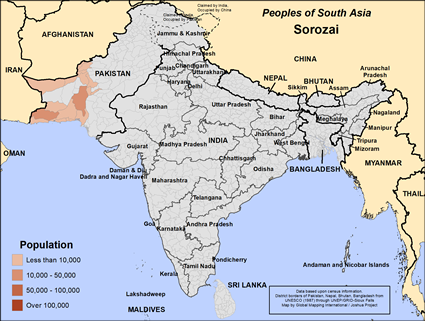Sorozai in Pakistan

Send Joshua Project a photo
of this people group. |

Map Source:
People Group data: Omid. Map geography: UNESCO / GMI. Map Design: Joshua Project
|
| People Name: | Sorozai |
| Country: | Pakistan |
| 10/40 Window: | Yes |
| Population: | 59,000 |
| World Population: | 59,000 |
| Primary Language: | Balochi, Southern |
| Primary Religion: | Islam |
| Christian Adherents: | 0.00 % |
| Evangelicals: | 0.00 % |
| Scripture: | New Testament |
| Ministry Resources: | Yes |
| Jesus Film: | Yes |
| Audio Recordings: | Yes |
| People Cluster: | South Asia Muslim - other |
| Affinity Bloc: | South Asian Peoples |
| Progress Level: |
|
Introduction / History
The Sorozai is a Pashtun tribe found in Pakistan. They live in Balochistan and Khyber Pakhtunkhwa provinces. They are one of the largest and most influential tribes in the region and have a long history of involvement in politics, commerce and tribal leadership.
There have been efforts to reach the Pashtun since 1818, when William Carey translated parts of the Old Testament into Pakhto, based on interaction with Pashtun traders who caravanned (and settled) across north India and beyond. (In South Asia, the name "Pashtun/Pakhtun" was anglicized to "Pathan"—a name immortalized in Rudyard Kipling's novels and British colonial history; today, the Pashtun in India, Bangladesh, and throughout South Asia are known as "Pathan".) The first intentional mission to the Pashtun was launched by the Church Missionary Society in Peshawar, Pakistan (then Northwest India) in 1853. This was followed by over 150 years of faithful witness, through mission hospitals, schools, colleges, literature, friendship evangelism, and other forms of witness by national Pakistani (Punjabi) Christians and expatriate missionaries. Despite this record, and the slow but growing number of scattered Pashtun believers, a vibrant, indigenous, disciple-making movement has yet to take root and spread.
What Are Their Lives Like?
As one of the Pashtun tribes, they have much power in their part of Pakistan and in the local economy.
During the 1990s, Pashtun tribal areas and thousands of Arab-funded madrassas (religious schools) throughout Pakistan, became the seedbed for the rise of the Taliban movement. Driven by a combination of religious zeal and Pashtun nationalism, and fueled by Arab money, the "Taliban" (a term for "religious students") succeeded in imposing a harsh, hyper-conservative (Wahabi) version of Islam on neighboring Afghanistan. This situation is bringing instability and tragic consequences to the Pashtun peoples like the Sorazai who live in Pakistan.
What Are Their Beliefs?
Almost all Sorozai Pashtuns are Sunni Muslims. Right religious practice (orthopraxy) tends to be more important than right belief (orthodoxy). Actual religious practice and piety vary according to context. As in other parts of the Muslim world, some Pashtuns are cultural Muslims; others are secular, or non-practicing; still others identify with the mystical tradition of Islam.
Pashtuns fear the influence of demons and evil spirits and seek protection by visiting the shrines of Muslim saints through amulets and charms, astrology, and fortune telling. Driven by felt needs—healing, desire for a son, relief from an abusive spouse—women especially turn to folk practices to ward off evil and seek God's favor.
What Are Their Needs?
The Sorozai and other Pashtun peoples need the chance to hear and respond to the lovingkindness of the Lord. Their view of God is twisted by the harsh dictates of those who use Islam as a way to control and destroy those who get in their way. How will they hear about the grace and undying love of the one true God?
Prayer Points
Pray for a "Book of Acts" type of movement to Christ among the Sorozai.
Pray God will have mercy on the Sorozai, doing whatever it takes to place them in a position to receive him.
Ask God to open the hearts of the Sorozai to the finished work of Christ.
Pray for an unstoppable movement to Christ that will spread to other Pashtun tribes in Pakistan.